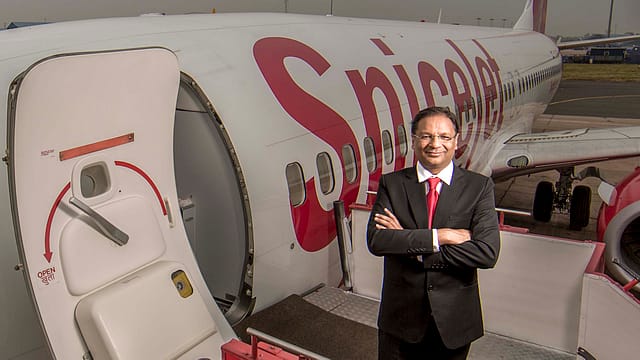SpiceJet shares surge 8% on finalising lease for 10 aircrafts
ADVERTISEMENT

Shares of SpiceJet surged as much as 8% to hit an intraday high of ₹54.50 apiece on the BSE, after the low-cost carrier finalised lease agreements for 10 aircraft as part of its effort to augment capacity in preparation for the upcoming summer schedule.
The scrip opened gap-down at ₹49.85, down 1.03%, as against the previous closing price of ₹50.37. The stock, however, gained momentum in line with the broader BSE Sensex, which was trading 503.34 points higher at 73,265.43.
At 1:04 pm, the share price of SpiceJet was trading 6.81% higher at ₹53.80. The airline’s market capitalisation stood at ₹3,691.32 crore, with more than 48.67 shares exchanging hands on the BSE, as against the two-week average of 39.24 lakh shares. The company hit a 52-week high of ₹77.50 on February 5 this year and a 52-week low of ₹22.65 on May 23 last year.
In the year-to-date period, the share price of the airline has plummeted 9.81%.
According to Ajay Singh-led airline, SpiceJet is committed to providing seamless connectivity and enhanced services to its passengers during peak travel seasons. “The additional aircraft will enable the airline to meet the growing demand for air travel, particularly during the busy summer months. SpiceJet has received three airframes as part of recent settlement agreements, further strengthening its fleet capabilities. These settlements with key aircraft lessors have also resulted in savings of ₹685 Crore for the airline,” says the airline.
The development comes days after the low-cost carrier announced the resolution of a $49.8 million (₹413 crore) dispute with Echelon Ireland Madison One Ltd. Last week, the airline also reached a settlement in terms with aircraft leasing firm, Cross Ocean Partners, resolving a dispute of about $11.2 million (₹93 crore). Last month, the company settled a ₹250 crore dispute with Celestial Aviation.
SpiceJet is currently in the midst of a revival plan, having completed the first tranche of capital infusion amounting to ₹744 crore.
Notably, the low-cost carrier continues to face financial crunch, legal woes and regulatory troubles. The Ajay Singh-led company is also resorting to cost-cutting measures such as laying off as many as 1,000 employees as it aims to achieve “profitable growth.”
Meanwhile, in February this year, the low-cost carrier submitted a joint bid for bankrupt no-frills carrier Go First. Singh submitted the bid in his personal capacity along with Busy Bee Airways Private Ltd. SpiceJet said its role as the operating partner for the new airline involves providing essential staff, services, and industry expertise. This collaboration is anticipated to generate synergies between the two carriers, leading to improved cost management, revenue growth, and a strengthened market position within the Indian aviation industry, the company said.